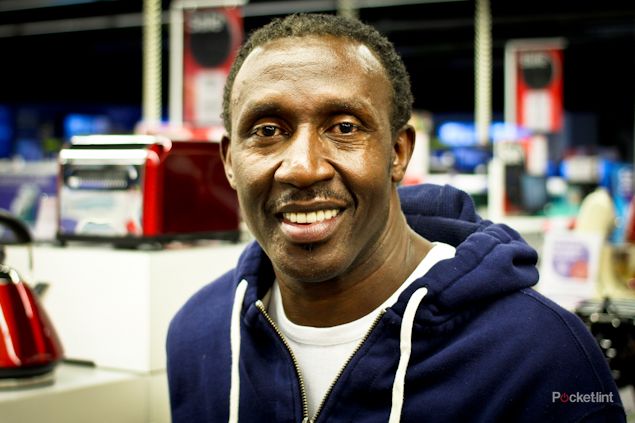Olympic gold medal winning sprinter and now running coach Linford Christie has always used technology as part of his training regime, but believes that young athletes, including those competing for Team GB at the London 2012 Games, have never had it so good.
However, in an exclusive one-to-one interview with Pocket-lint, he also revealed that there was much more money in the sport when he was competing.
Christie, who won the 100 metres sprint gold at the Barcelona Olympics in 1992, explained that while the tech he used to help him train in the 1980s and early Nineties was hugely expensive, even a humble smartphone is an important tool for the current generation.
"I bought my starting machine in, gosh, maybe 1984 or something like that," he told us. "And at that time I paid $500 dollars for it [more than$1,100 in today’s money]. And it’s a big box – they’ve got little tiny things now.
"Now, you’ve got a camera on all the phones, you can watch your technique, you can learn so much about things."
His coaching is certainly benefiting from this new wave of cheaper, more accessible tech. "We use a lot of technology," said Christie. "We use a timing machine. We do block starts and everything else. We’re always trying to get quicker, so it tells you how fast you run, every 10 metres or so.
"The stopwatches are a lot better now: you can time five, six or even maybe 20 people. We’ve got a machine that trains your reaction. And there’s even so many things that you can use to help athletes recover from injuries and get them back on the track."
And it doesn't stop at the current generation of gadgets. "Sports technology has also improved so much. Spikes are a lot better, and the tracks are a lot faster. All of the clothing is more aerodynamic. Nutrition. Everything is just so much better," Christie explained.
"When I first started running, we ran on cinders. And if you fell on that, you had to pick it out yourself. We didn't even have St John's Ambulance crew around."
But although the technology is definitely helping the new generation of athletes train and perform, not everything is better in the 2010s. The money, for starters.
Christie told us that instead of getting more money, track and field athletes, Team GB members included, are actually being paid less than he got 20 years ago. And that's to the detriment of the sport. "There’s less money now than when I was competing. There’s a lot less money," he said.
"Those days, we were more independent. We could do what we wanted to do. If we wanted to go here or there to train, we could afford it. Now there’s not so much money, so there’s more control. The athletes nowadays, they’re bit more Stepford Wife-ish. And I think that’s where it’s gone wrong."
The money Christie and those of his generation made allowed them to dedicate 100 per cent of their time and effort to their sport. "We just trained full time because we made a living; sponsorship and those sorts of things. And when you ran, you got paid appearance money," he said.
"Now, these guys they run for bonuses and the bonuses are dwindling because there’s less money and more people fighting for it. It’s one of the few professions where the wages have gotten less due to progress or inflation."
Sad as that may be though, he did point out that Britain is one of the best in the world at looking after its sportsmen and women. "We're the best," he proudly proclaimed. "We have more meets than anyone else - especially track and field. And we have more resources than anybody else [in Europe] to hone the best athletes."
Roll on the Olympic Games.
Linford was commissioned by Currys and PC World to create an exercise training video for store colleagues motivating them through a summer of epic sporting events and therefore strong TV, tablet and laptop sales.
Check out www.currys.co.uk and www.pcworld.co.uk.

